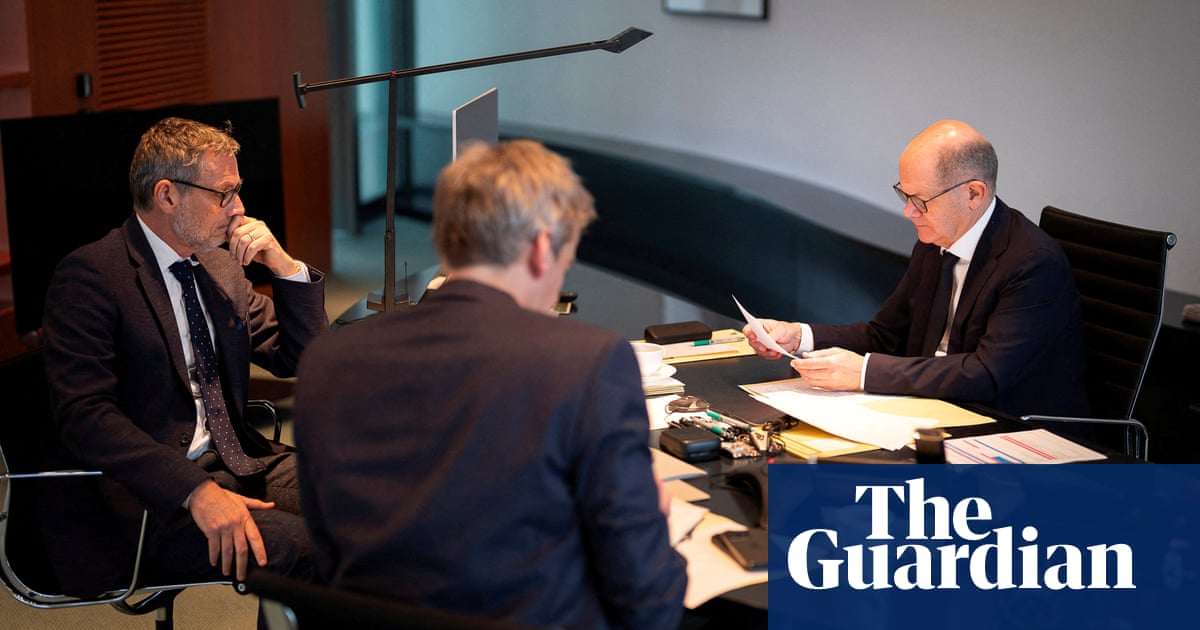Olaf Scholz and Vladimir Putin held a rare phone call on Friday in which the German leader urged his Russian counterpart to withdraw troops from Ukraine and negotiate with Kyiv to achieve a just and lasting peace.
The one-hour phone call, the first between the two leaders since December 2022, came after Putin reportedly spoke with the US president-elect, Donald Trump, whose incoming administration has vowed to push for a swift end to the war in Ukraine.
The German government spokesperson Steffen Hebestreit said Scholz stressed the unbreakable resolve of Germany to support Ukraine in Russia’s “war of aggression” for as long as possible.
Hebestreit said Scholz spoke with the Ukrainian president, Volodymyr Zelenskyy, before a phone call with Putin and was planning a call with Kyiv afterwards. The spokesperson added that Scholz would brief western allies on his conversation with Putin.
According to a readout of the conversation posted by the Kremlin, Putin told Scholz that any potential agreements on Ukraine should be based on the “new territorial realities and address the root causes of the conflict”.
Putin said Russia’s demands for ending the conflict were well known, referring to a speech he made in June when he staked out a maximalist position for an end to the war: Ukraine would have to drop its Nato ambitions and withdraw all its troops from all the territory of four regions claimed by Russia.
Scholz had recently signalled his willingness to make direct contact with Putin, while the Kremlin said it was open to a conversation.
The call between the two leaders comes at a critical juncture in Moscow’s full-scale invasion of Ukraine. Moscow, with support from North Korean soldiers, is planning a significant assault to drive Ukrainian forces out of its western Kursk region, while Russian forces are making rapid advances in the east of Ukraine.
Scholz told Putin that the deployment of North Korean soldiers, which Moscow has not officially acknowledged, was a “serious escalation” in the war. The two leaders agreed to keep in contact in the future.
Scholz’s willingness to engage with Putin is likely to provoke frustration in Ukraine, whose future became uncertain after Trump’s victory, raising concerns that the US might end its military assistance.
According to Reuters, Zelenskyy cautioned Scholz against speaking to Putin by phone, saying it would reduce the Russian leader’s isolation and keep the war going.
Zelenskyy has also sought to court Trump in recent days, telling a Ukrainian broadcaster that Russia’s war against his country would “end sooner” under the new administration.
“The war will end, but there is no exact date. Of course, with the policy of this team, which will now lead the White House, the war will end sooner,” he told Suspilne on Friday. He stressed that “fair peace” was vital for Ukraine.
The call between Putin and Scholz came at a sensitive time for Germany. Last week the country was plunged into political turmoil after Scholz’s decision to oust his finance minister, a move that led to the breakup of his government. Germany will hold a snap election on 23 February.
The topic of Ukraine has played a prominent role in the country’s political crisis, with a dispute over how to continue financing Ukraine partly to blame for the fallout.
Another point of contention in Germany has been Scholz’s refusal to allow Ukraine to strike Russian territory with long-range Taurus missiles. Scholz said this week he stood by his decision not to supply Kyiv with the missiles, arguing that the approach had helped avoid escalating the war.
His main opponent, the conservative leader Friedrich Merz, has adopted a more hawkish stance on military support for Ukraine, reportedly expressing willingness to allow the use of Taurus missiles if Putin does not cease bombing civilian targets.
As the second biggest backer of Ukraine after the US, Germany faces concerns that it will be left to take on a far bigger share of the war effort if Trump carries out his threat to reduce support for Kyiv. In an effort to calm nerves across Europe, the US secretary of state, Antony Blinken, travelled to Brussels on Wednesday pledging to shore up support for Ukraine until Trump takes office.
Putin has not spoken to most Nato and western leaders since 2022, when the EU and the US imposed significant sanctions on Russia for launching its shock Ukraine offensive.
Trump has claimed he would end the war in Ukraine “within a day” of returning to the White House, although he has not provided details on how this would be achieved.

